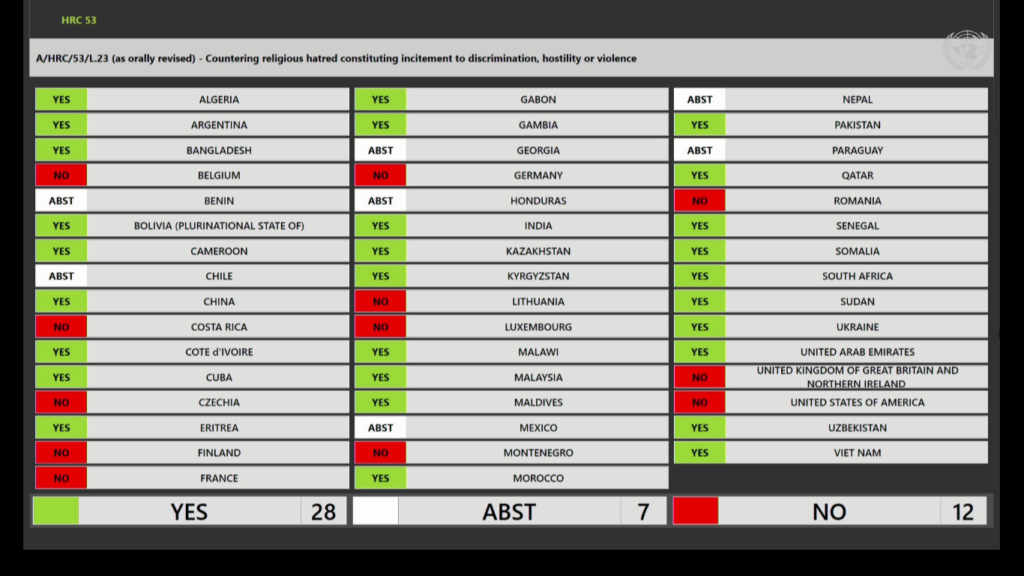Members of the UN Human Rights Council have voted in support of a contested resolution brought by Pakistan on religious hatred, which puts in peril a longstanding consensus on how to tackle religious intolerance in line with international law, and equates all acts of “desecration of sacred books and religious symbols” with manifestations of religious hatred.
The resolution, on “Countering religious hatred constituting incitement to discrimination, hostility or violence,” was introduced by Pakistan and Palestine in light of recent Quran burnings in Sweden. It was voted for after an urgent debate, requested by Pakistan, on “public acts of religious hatred as manifested by recurrent desecration of the Holy Quran” at the 53rd Session of the UN Human Rights Council.
The resolution was highly contested, with a number of states condemning the lack of time for discussion on the draft text or effort to reach a more consensus-based text, and others highlighting the dangers of how such a text goes against standards on freedom of expression and religion or belief and prioritises symbols over people.
In the end, 28 countries voted in favor of the resolution today, seven abstained and 12 countries voted against it.*
The resolution poses a serious threat to the consensus that the UN Human Rights Council has maintained for the past 12 years on tackling religious intolerance not through blasphemy laws but through recognising the important role for free expression and counter speech in promoting tolerance, coupled with policies and laws to tackle the root causes of discrimination – as expressed in UN Resolution 16/18. The adoption of Resolution 16/18 on ‘combating intolerance, negative stereotyping and stigmatisation of, and discrimination, incitement to violence, and violence against persons based on religion or belief,’ was widely regarded as a landmark achievement of the Human Rights Council’s first decade.
Humanists International was part of a coalition of NGOs that had called for Human Rights Council members to reject the resolution as first drafted, in a letter which carefully outlined the dangers posed by the resolution to human rights standards in general and to the integrity of consensus-led action on tackling religious hatred. The resolution was amended orally during the debate to remove the automatic link it had made between the “desecration” of religious symbols and incitement to violence.
Humanists International also made a statement during the debate, in which it expressed its horror at the rise in hatred against persons on the basis of their religion or belief and condemned all expressions of such hatred. The statement also called for incitement to violence or hatred to be tackled with renewed commitment and in line with international law.
The statement also said however, that:
“The ‘desecration’ of religious books and symbols cannot in itself always be equated with incitement. Context is vital when assessing whether a particular expression reaches the prohibited threshold under Article 20 of the International Convention on Civil and Political Rights; and ignoring that with blanket bans like anti-blasphemy or religious defamation laws paves the way for mass censorship and the silencing of legitimate expression and dissent.”
It pointed out:
“Such bans often target people from minority religions or beliefs whose very existence may challenge the convictions of majority religious communities or highlight the instrumentalization of religion by those in power.”
The statement reminded the Council that there is consensus at the international level that prohibitions on defamation of religions and protection of religious ideas, institutions, or symbols are not only contrary to human rights standards, but are prone to abuse – including against the religious minorities they purport to protect – and are actually counterproductive.
The statement concluded,
“Instead of countries who currently have blasphemy laws that imprison marginalized minorities for expressing their religion or belief, pointing fingers, we must instead commit together to tackling hate against people in a way that actually protects those individuals, and maintains the integrity of the human rights system for all.”
Humanists International also supported a statement made by the NGO Article 19 during the same debate.

Voting results on the UN Human Rights Council resolution on Countering religious hatred constituting incitement to discrimination, hostility or violence
* List of Human Rights Council members who voted in favor of the resolution: Algeria, Argentina, Bangladesh, Bolivia, Cameroon, China, Cote d’Ivoire, Cuba, Eritrea, Gabon, Gambia, India, Kazakhstan, Kyrgyzstan, Malawi, Malaysia, Maldives, Morocco, Pakistan, Qatar, Senegal, Somalia, South Africa, Sudan, Ukraine, United Arab Emirates, Uzbekistan, Viet Nam. List of List of Human Rights Council members who abstained: Benin, Chile, Georgia, Honduras, Mexico, Nepal, Paraguay. List of List of Human Rights Council members who voted against: Belgium, Costa Rica, Czechia, Finland, France, Germany, Lithuania, Luxembourg, Montenegro, Romania, United Kingdom, United States of America.